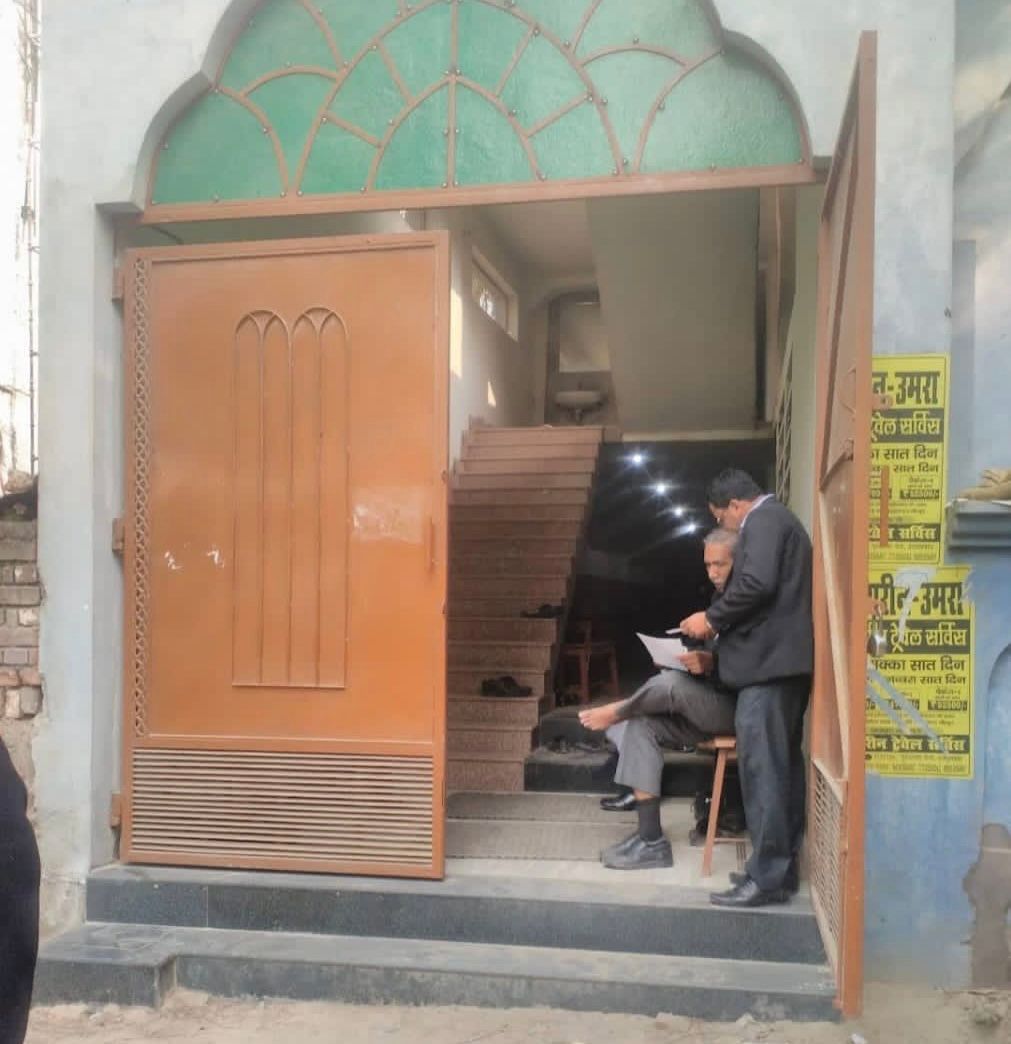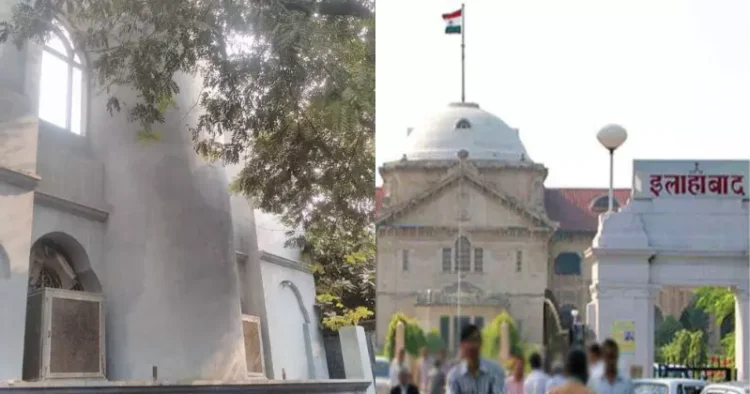On March 13, the Supreme Court (SC) of India affirmed the Allahabad High Court’s 2017 order to remove a mosque named ‘Masjid High Court’ from the court’s premises, Live Law reported.
The SC dismissed the Special Leave Petition (SLP) filed by Waqf Masjid High Court and the UP Sunni Central Waqf Board and granted the petitioners three months to remove the mosque from Allahabad High Court’s premises. The Court stated that the authorities would be allowed to remove or demolish the mosque if the petitions fail to remove the most from the Allahabad High Court’s premises within the stipulated time.
The SC also allowed the petitioners to make representations with the Uttar Pradesh Government to allot an alternate land in a nearby area, considering that such land is not required for another public purpose, either present or future.
The Court told the Advocate MR Shamshad, the counsel for the Mosque, that they cannot claim the right to the leased property since the lease was terminated and the land was resumed and confirmed by the Apex Court, Live Law reported. The Court said, “Try to understand one thing. You have no right. It was a lease property. Lease was terminated and land was resumed and confirmed by this Court. Immediately, it was registered as waqf. You can’t claim as a matter of right to continue.”
Allahabad High Court’s arguments before the Supreme Court
The counsel for Allahabad High Court, Senior Advocate Rakesh Dwivedi, argued, “The first legal point is on private lease land, you cannot create a waqf. You have only limited rights as a lessee. There are restrictions. And now they try to give a religious colour. They have no right…It was a nazul land and as per patta conditions, there was no permission to raise a mosque there. The tin sheet building was raised there without authorization,” Live Law reported.
“Mere fact that they are offering namaz will not make it a mosque. If in the Supreme Court verandah or HC verandah namaz is allowed for convenience, it will not become a mosque. These activities will not make it a mosque. Mosque is a serious affair. It should be dedicated in a proper way. Sometimes we see namaz in roads outside small mosques. That will not make the roads mosque,” he submitted.
Furthermore, he submitted, “This is a case of complete fraud and religious colours are given. In 2002, they managed to get it registered as a waqf to stall eviction and they managed for 20 years. Then they say it is because of the Govt change. They are making religious colours in the HC direction too,” Live Law reported.

2017: PIL against illegal encroachment on Allahabad High Court’s land
The case pertains to a mosque situated within the Allahabad High Court’s premises which were illegally constructed on encroached land. In 2017, the Allahabad High Court instructed the Registrar-General to ensure that no part of the court’s premises, whether in Allahabad or Lucknow, was used “for practising religion or offering prayers or to worship or to carry on any religious activity by any group of persons.”
In 2017, Allahabad High Court’s then-Chief Justice Dilip B Bhosale delivered the judgement pertaining to a mosque situated within the Allahabad High Court’s premises which were illegally constructed on encroached land.
The Court observed that the plot-in-dispute was leased to Thomas Crowby for a period of 50 years by the Secretary of State for India in Council and it was signed by the Commissioner of Allahabad Division, for the construction of a dwelling house in 1868. The lease was later renewed till December 31, 1967, in favour of Thomas Crowby’s successor Edmond John Ducasse.
However, Edmond John Ducasse executed a sale deed in respect of the plot and the dwelling house in favour of Lala Purshottam Das. The sale deed was registered on April 18, 1945. On October 30, 1958, Lala Purshottam Das’s representatives assigned the leasehold rights in favour of the family members of Mohd. Ahmad Kazmi, who then was a practising Advocate of this Court and also a former Member of Parliament (1952-1957).
In 1967, the lease expired and was not renewed for a long time. However, the Uttar Pradesh Government executed a fresh lease deed on March 19, 1996, for a 30-year period with effect from January 1, 1968, till December 31, 1997, in favour of the lessees. This deed contained a clause that the lease deed would be renewed for two successive terms of 30 years each, but the total period shall not exceed 90 years, including the original term. After the expiry of the period of 30 years on December 31, 1997,
The deed was renewed for a further period of 30 years with effect from January 1, 1998, after its expiry of the period of 30 years on December 31, 1997. However, on December 15, 2000, the State Government issued an order, conveying its decision to the Collector, Allahabad, to resume the plot for the purposes of extension of the building of the High Court and for the Advocate General’s Office.
The Uttar Pradesh Government informed the lessees about December 15, 2000, Government Order cancelling the lease and resuming possession of the plot, as the same was required for a public purpose, as stipulated under clause 3 (c) of the lease. The lessees filed a writ petition against the Government Order for a stay on possession of the plot. The Allahabad High Court disposed of the writ petition on December 7, 2001.
In the 2001 writ petition, the Court observed, “Clause 3 (C) of the lease deed gives absolute power that if the land is required for its own purpose or for any public purpose, the State Government shall have right to give one month’s notice to the lessees to remove any building standing on the demised premises and within two months of the receipt of the notice to take possession thereof on the expiry of that period.”
“It is, therefore, wrong to suggest that the requirement of the land for a public purpose was not in existence when the lease was renewed. We fail to understand as to how the State Government is estopped from resuming the land merely on account of renewal of the lease in favour of the lessees. Since the very inception, when the lease was executed in favour of the successors of Thomas Crowby on 12.4.1923 and then again when the lease was executed in favour of the present lessees on 19.3.1996, there has always been a clause that the lessor will have a right to resume the lease and take possession of the plot,” the Court said in the 2001 writ petition.
In the 2001 writ petition, the Court concluded, “The writ petition accordingly fails and is hereby dismissed. It is, however, made clear that the State Government is not entitled to take forcible possession. It may take possession of the demised premises in accordance with the procedure established by law.”

However, the lessees filed an SLP before the SC against the Allahabad High Court’s judgement in the 2001 writ petition. The SC observed, “It is open to the State of U.P. to take possession of the land by giving the appellants three months’ time to vacate and put the respondent- State in possession of the land and the respondent is free to use the land for the public purpose for which it has been sought to be reacquired.”
The lessee’s SLP later converted into a Civil Appeal and was disposed of in 2012. The SC observed, “The clause of re-entry was not introduced for the first time in the deed executed in 1996 but also contained as one of the clause in lease deed dated April 12, 1923 wherein it was stipulated that if the Government shall at any time require to re-enter on the demised plot it can do so, on paying the cost of the building that may be on the site and that the lessee shall have no further claim of any sort against the Government.”
“Therefore, the contention of the lessee that it was for the first time in their case that a lease had been cancelled and the plot has been resumed by the State Government under the terms of the deed is, therefore, not correct and a similar course of action has been taken in the past also. Therefore, the violation of Article 14 cannot be alleged in the present case,” the SC added.
The SC affirmed the State Government’s Order dated December 15, 2002, and stated “The State Government is allowed to take possession of the demised premises for extension of High Court building etc., as decided. However, the appellants are given three months’ time to hand over the possession of the land and building to the State and, if so necessary, the State Government will issue a fresh cheque for rupees ten lakhs in favour of the appellants, if earlier cheque has expired and not encashed. If the appellants fail to handover the possession of demised premises or create any third party interest in such case the State Government and the District Magistrate, Allahabad in particular will take forcible possession of the demised premises.”

Waqf created to obstruct UP Government from taking back land
It is pertinent to note that after the Allahabad High Court dismissed the lessees’ writ petition through its judgement on December 7, 2001, the plot was applied for registration of a Waqf to UP Sunni Central Board of Waqf and it was, accordingly, registered under Section 36 of the Waqf Act.
In the 2017 judgement, the Allahabad High Court observed, “In the instant case as well, we are of the considered opinion that the lessees never had any intention of dedicating and divesting themselves of their title; that the creation of waqf was a device to create obstruction in resumption of the demised land and taking over of its possession; that no valid waqf ever came into existence; and that all steps in this regard were taken around the period when writ petition filed by the lessees was dismissed and the lessees had lost all hope of retaining possession over the demised land.”
The Allahabad High Court added, “We are of the firm opinion that there was no public mosque, nor any waqf, in existence, at the time when the proposal to resume the leased land was mooted, nor even at the time it was allotted to the High Court and the Advocate General Office, not even till the writ petition was dismissed by this court by judgment dated 07.12.2001. It was around the said period that respondent no.7 with connivance of respondent no.8 (ex-lessee), knowing well the fate of pending litigation, started creating evidence regarding existence of a public mosque, oblivious of the fact that in the writ petition filed by them, nor even in the SLP before the Supreme Court, any such plea was taken.”
The Allahabad High Court directed the Waqf to handover the vacant and peaceful possession of the plot to the Allahabad High Court within three months from the judgement’s date. The Court said, “Respondent No.7-Waqf, shall handover vacant and peaceful possession of the site in dispute to respondent no.1-High Court, within a period of three months from today.”



















Comments